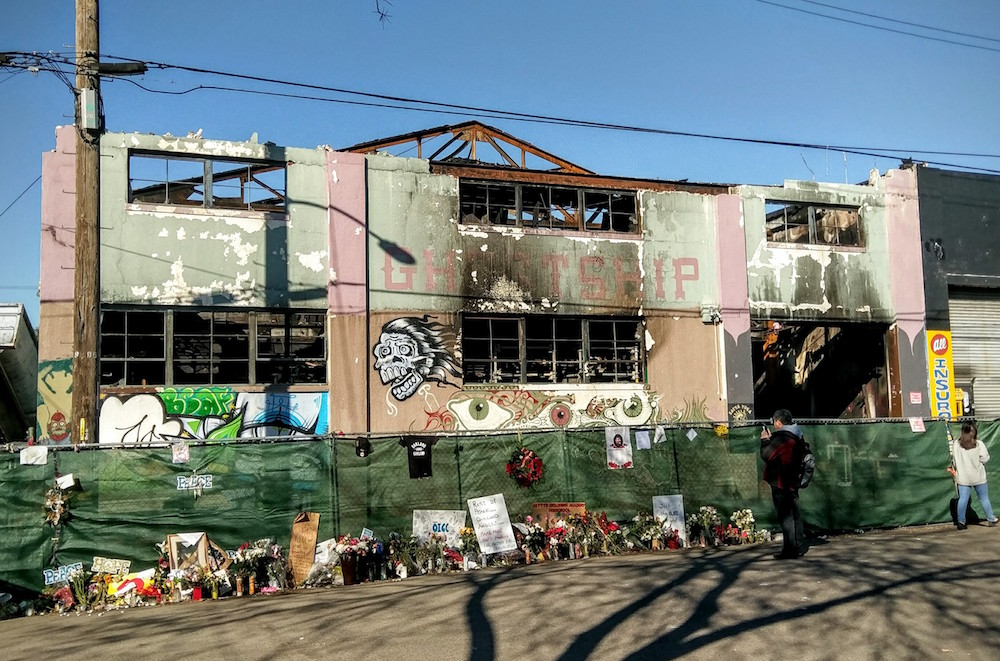The judge in the Ghost Ship warehouse fire trial said on Thursday that she will decide on Monday whether she will allow a witness to tell jurors that she overheard a group of Latino men claiming that they started the 2016 blaze that killed 36 people.
Alameda County Superior Court Judge Trina Thompson said she will allow Sharon Evans to be the first witness when lawyers for Ghost Ship creative director Max Harris begin presenting their case on Monday but she said “some areas may be inadmissible hearsay” that she won’t let jurors hear.
Harris, 29, and Ghost Ship master tenant Derick Almena, 49, are charged with 36 counts of involuntary manslaughter, one for each of the 36 people who died of smoke inhalation at a music party at the building in the 1300 block of 31st Avenue in Oakland’s heavily-Latino Fruitvale district the night of Dec. 2, 2016. Prosecutors, who finished presenting their case on Wednesday, allege that Almena and Harris are criminally responsible for the fire because the people at the party didn’t have the time or opportunity to escape the blaze since the warehouse didn’t have important safeguards, such as fire extinguishers, smoke alarms and lighted exit signs.
But defense attorneys allege that the fire was an act of arson that the two defendants couldn’t have prevented. However, fire investigators who testified as prosecution witnesses said they didn’t find any evidence of arson. Harris’ lawyers will be calling Oakland resident Sharon Evans to the witness stand to try to support their claim that the fire was an act of arson.
In a hearing outside the presence of jurors on Thursday, Evans said she heard a group of 14 to 19 Latino men say, “The way they started the fire nobody would get out.” Evans, 67, who’s lived in Oakland most of her life, said, “They kept saying they was happy and satisfied about how the fire was burning.” Evans said, “They wasn’t upset, they was happy, like it was a big party. It made me sick to my stomach.”
Evans said she was in the area because she’d attended a service at her church at 57th Avenue and International Boulevard in East Oakland that night and afterward went with a friend to a taco truck near the warehouse. She said the group of Latino men, who she said were wearing hoodies over their heads, cut in front of her as she was getting in line at the taco truck.
Evans said the men “were laughing and congratulating themselves” for setting the fire. But she said, “They didn’t say how they started the fire, they just said they started it in the back.”
Prosecutor Casey Bates Evans tried to cut holes in Evans’ testimony when he cross-examined her, getting her to admit that she never called police to report what she heard the men say and that some of her statements in court differed from statements she gave to prosecutors and civil attorneys in 2017. However, Evans said she went to the warehouse a short time after the fire while there were still many investigators there and left her name and phone number but no one ever called her back.
Under questioning by Bates, Evans conceded that in one of her previous statements she said she heard the men say they had moved bleachers and stands to block the warehouse’s stairway to prevent people from escaping. None of the other witnesses in the six-week-long trial have said anything about there being bleachers or stands at the warehouse, which served as an artists’ collective.
Late in the day on Thursday, Thompson denied motions by lawyers for Almena and Harris asking that the charges against them be dismissed for a lack of evidence. Thompson said prosecutors presented “enough evidence for the jury to make the final decision” about whether the two men are guilty of involuntary manslaughter.
